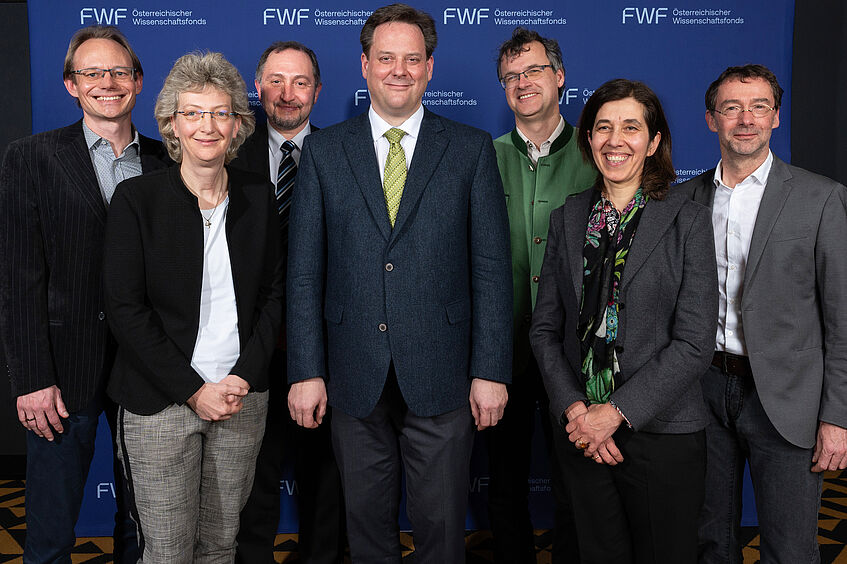Cluster of Excellence Circular Bioengineering: Cutting-edge research for the future

© FWF/Daniel Novotny
Board of Directors: Chris Oostenbrink (BOKU University), Antje Potthast (BOKU University), Marko Mihovilovic (TU Vienna), Roland Ludwig (BOKU University), Wolfgang Kroutil (University of Graz), Gunda Köllensperger (University of Vienna), Bernd Nidetzky (TU Graz)
Grand ideas require grand scale to succeed. Austria’s renowned Clusters of Excellence, funded by the FWF, provide the framework for such ambitious endeavors, enabling teams from multiple institutions to collaborate intensively over five years.
The newly launched Cluster of Excellence Circular Bioengineering brings together researchers from the University of Vienna, BOKU University, TU Wien, TU Graz, and the University of Graz. Their mission is to drive a paradigm shift in how goods are produced, consumed, and renewed.
With €16 million in FWF funding, this cluster marks a major step toward sustainable innovation. By leveraging cutting-edge research in molecular biosciences and biotechnology, the goal is to design and engineer bio-based materials that are sustainable, efficient, and waste-free.
We want nothing less than to make a transformation and to make a real change. We want to get away from this plastic immersion and to look for materials and create materials which are perfectly circular with no waste.
Gunda Köllensperger who represents the University of Vienna in the Board of Directors criticizes the status quo: "We take raw materials, most of them fossil fuel based. We construct materials out of this components and then we consume them and just put them to waste, dispose them to waste, without strategy of making them circular and this is not sustainable at all." In contrast to this, she proposes a solution to ensure sustainability for future generations: "We need a transformative science which needs a critical mass of different disciplines and different institutions working together and this is exactly what this cluster allows us to do."
Her colleague at the Department of the Analytical Chemistry, Professor Jürgen Zanghellini, highlights that there are countless materials available. "We just need to screen. But then we have a huge amount of data sets that we want to characterize with artificial intelligence that help us pick out the right materials for experimental verification."
The key challenge is identifying which renewable materials can replace current non-renewable, fossil-based ones, explains Professor Alexander Bismarck from the Institute of Material Chemistry. Nature harnesses CO2 from the atmosphere to grow, relying on structural elements like cellulose and chitin. By combining these with lignin, the goal is to create innovative materials with attractive property profiles for a wide range of applications.
The materials chemist, Associate Professor Robert Woodward, aims to design materials with controlled end-of-life degradation, ensuring durability during use. This will create a circular system in which renewable substrates are used to produce functional materials that degrade into biodegradable substances after use.
In summary, the Cluster of Excellence Circular Bioengineering offers the participating teams the chance to cultivate a new generation of circular bioengineering scientists. Professor Gunda Köllensperger concludes: "These scientists will be equipped to think beyond traditional boundaries, collaborate across disciplines, and drive the transformation toward a bio-based, sustainable economy."
